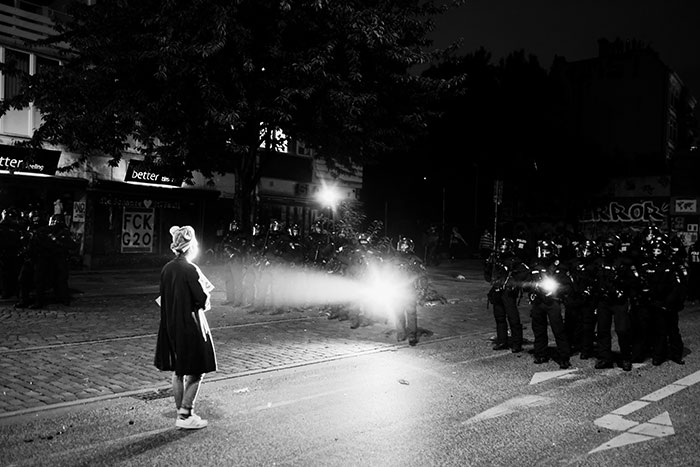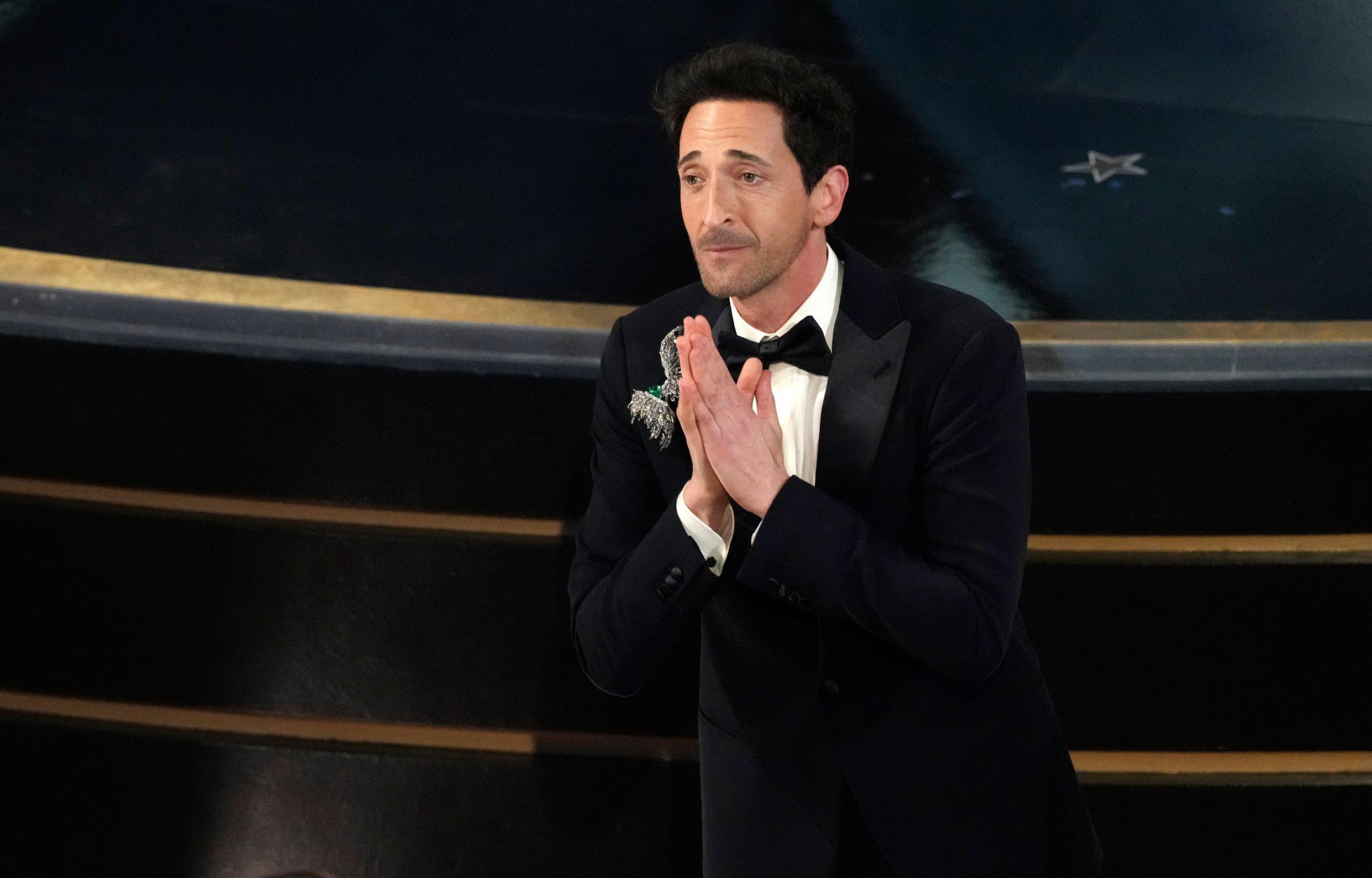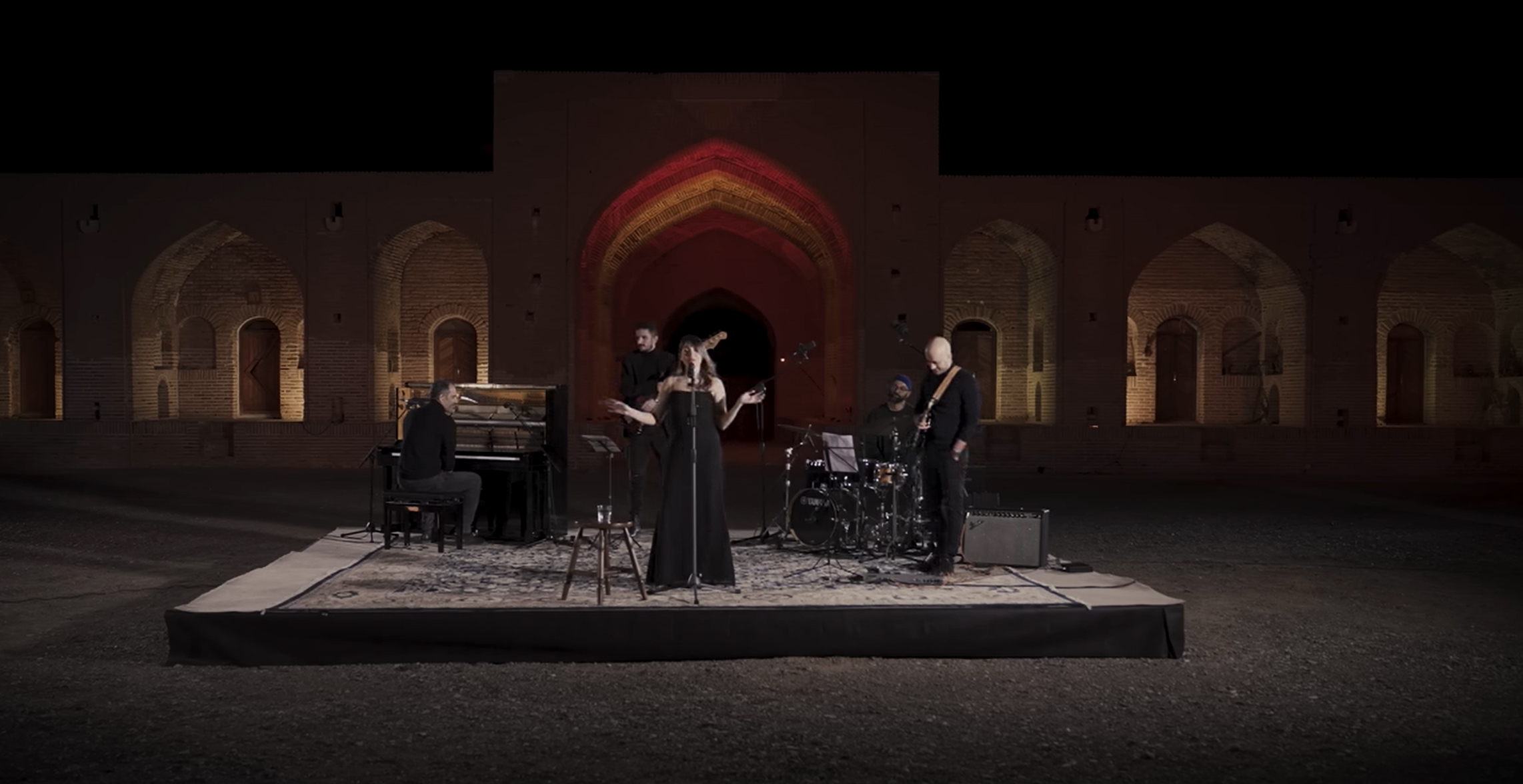[vc_row][vc_column][vc_column_text]

German police confront a protester on 8 July during the G20 summit in Hamburg. (Photo: Konrad Lembcke / Flickr)
Journalists covering the G20 Summit in Hamburg in July were subject to assaults, intimidation and some lost their accreditation, according to verified incidents documented by Index on Censorship’s project Mapping Media Freedom.
Several journalists reported that they were assaulted by police while covering protests against the meeting, which included leaders of the 19 largest industrial nations in the world plus the EU. Leading up to the summit, freelance journalist Martin Eimermacher was assaulted while police were clearing a protest camp in Hamburg on 2 July, according to Netzpolitik and Jetzt.
Police had demolished protesters’ tents when Eimermacher tried to leave the area, telling police he felt unwell. He said that officers pushed him and several other journalists to the centre of a field. He showed his press card, which was slapped out of his hand by a police officer who then pepper sprayed him.
“In my opinion the most dangerous thing is that this sets an example within Germany and beyond, that such treatment of journalists is acceptable,” Mapping Media Freedom Germany correspondent Pascale Müller said. “There seemed to have been, on an individual level of police officers, a severe lack of understanding of the rights of the press and their role as an observer and part of a healthy democracy.”
On 7 July, ITN News journalist Flo Smith, his producer and cameraperson were all pepper sprayed by police. Photojournalist Henry Langston of Vice UK was struck by a police water cannon. RT UK published a video in which police assaulted and injured photojournalist Zino Peterk, who later had to go to the hospital for his injuries.
On 8 July, Spiegel Online photographer Chris Grodotzki said police assaulted him with pepper spray while he was covering protests in Schulterblatt. Taz reporter Martin Kaul sustained minor injuries when he was hit by protesters while live-streaming the demonstration, according to Deutschlandfunk. Müller noted that some attacks by protesters targeted journalists they perceived as right-wing, “but in some cases it seems that people were already so ‘high on violence’ that they hurt journalists regardless of their political affiliation.”[/vc_column_text][vc_separator][vc_custom_heading text=”Media freedom is under threat worldwide. Journalists are threatened, jailed and even killed simply for doing their job.” font_container=”tag:h3|text_align:left” use_theme_fonts=”yes” link=”url:https%3A%2F%2Fwww.indexoncensorship.org%2Fcampaigns%2Fpress-regulation%2F|||”][vc_row_inner][vc_column_inner width=”1/2″][vc_column_text]
Index on Censorship monitors press freedom in Germany and 41 other European area nations.
As of 4/8/2017, there were 101 verified incidents associated with Germany in the Mapping Media Freedom database.
[/vc_column_text][/vc_column_inner][vc_column_inner width=”1/2″][vc_column_text]Index on Censorship campaigns against laws that stifle journalists’ work. We also publish an award-winning magazine featuring work by and about censored journalists. Support our work today.[/vc_column_text][/vc_column_inner][/vc_row_inner][vc_separator][vc_column_text]“Many journalists who covered the protest directly and that I have spoken to were emotionally and physically affected even a week after” Müller said. The press freedom violations were widely condemned, but according to Müller “The most shocking revelation came after the protests, when Sueddeutsche Zeitung revealed that the BKA had monitored selected journalists during their summit coverage over the past 10 years. This was very disturbing and lead to a certain level of insecurity within the profession. “
Other journalists reported the use of intimidation tactics by police. In the Schanze neighbourhood, Frank Schneider, a reporter for Bild, tweeted that police told journalists to “leave or you’ll go to the hospital”. F-Mag journalist Wiebke Harms reported on Twitter that police in Schanze told her: “Your press card is worth nothing.” Freelance journalist Reuben Neugebauer was told “now press freedom is over”.
Thirty-two journalists had their accreditation revoked by federal police on 7 and 8 July. German government spokesperson Steffen Seibert cited ‘security concerns’ as the rationale for the loss of access to the summit.
Journalists who lost accreditation include the photographer Björn Kietzmann, Rafael Heygster (Weser Kurier), photographer for Junge Welt, Willi Effenberger Alfred Denzinger (Beobachter News), photographer Chris Grodotzki (Spiegel Online), Adil Yigit (Avrupa Postasi), editor Elsa Koester (Neues Deutschland) and freelance photographer Po Ming Cheung.
When trying to enter a press area, Grodotzki and Yigit were told by police that their accreditation was no longer valid. Photographers Björn Kietzmann for Weser Kurier and Rafael Heygster were also not allowed to enter the press area.
Müller does not think that this treatment will intimidate journalists into stepping back from events like this in the future. “Quite the opposite, I think that many journalists and their outlets are quite resilient against such types of violence or blocked access. G20 brought press freedom issues to the forefront in Germany and made journalists even more aware of their role as critical observers, even in the middle of such violent tension and intimidation attempts.”[/vc_column_text][/vc_column][/vc_row][vc_row][vc_column][vc_basic_grid post_type=”post” max_items=”12″ style=”load-more” items_per_page=”4″ element_width=”6″ grid_id=”vc_gid:1501833910854-5bf94268-20d1-5″ taxonomies=”77″][/vc_column][/vc_row]




